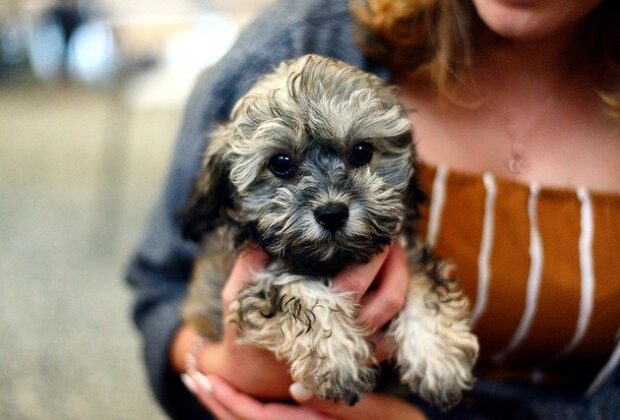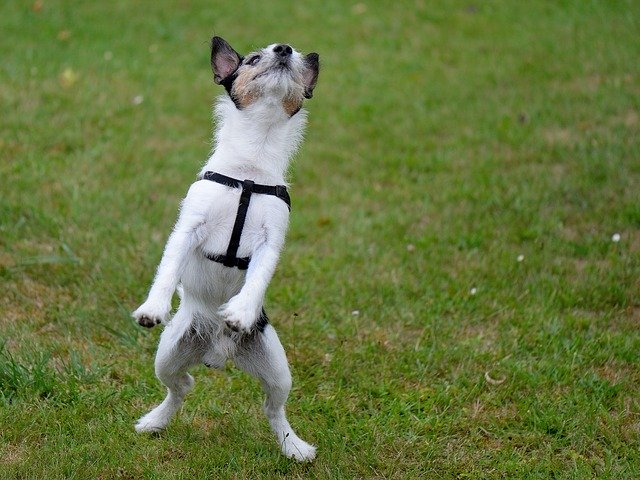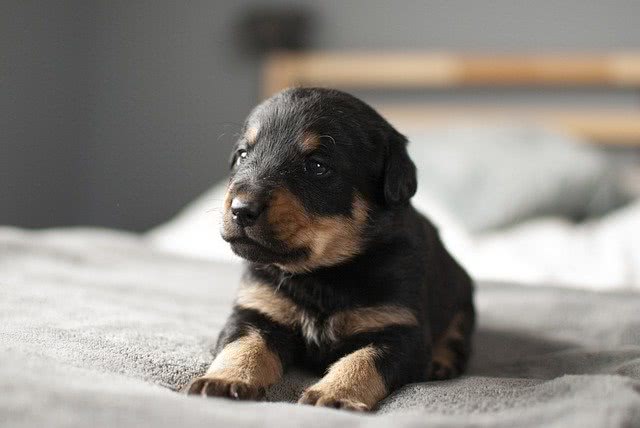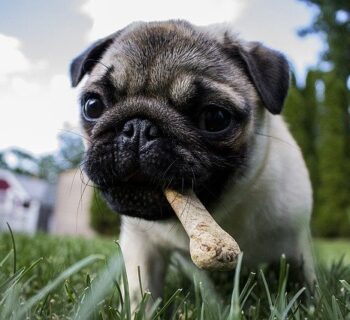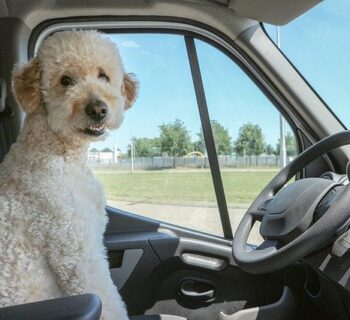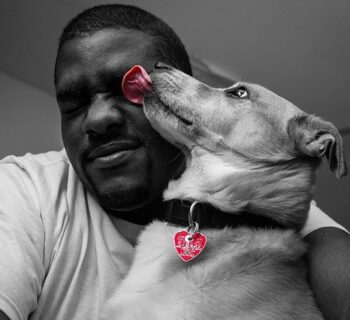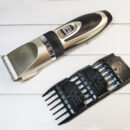Why do puppies get hiccups? If you own a puppy, you may have wondered why your dog gets hiccups, particularly if they occur too often. We’ll discuss hiccups in this article, what causes them, and what you can do if your pup gets hiccups regularly. Note, however, that if this has been going on for a prolonged period and you suspect an underlying condition to be a cause, you should immediately book an urgent appointment with the vet.
Table of Contents
What Are Hiccups and What Causes Them in Dogs?
Hiccups occur when the diaphragm (a dome-shaped area of the skeletal muscle separating the chest from the abdomen) contracts involuntarily. Usually, when a dog breathes in, the diaphragm contracts and move downward, creating room for the lungs to expand in the chest cavity. The diaphragm relaxes and moves upward into the chest cavity when they breathe out.
Causes of Hiccups in Dogs
What triggers this involuntary movement? Hiccups in dogs can happen for the same reason it happens in humans. This includes excitement, energetic play, rapid breathing, stress, eating or drinking too quickly, and swallowing too much air.
While hiccups typically go away without help and within a few minutes, they can become extended, with some lasting several minutes to a few hours.
We’ll share some tips for stopping dog hiccups. If your canine’s hiccups last more than a few minutes, you should do any of these. However, if they seem to linger for more than half an hour and become violent, you should have a vet check him. It is especially crucial if you notice a symptom like coughing as well.
How to Stop a Puppy’s Hiccups
Many human hiccup cures or treatments share lots of similarities with those you can use for dogs. Some of these treatments are listed below.
Water
Just like in humans, drinking water may help a puppy’s hiccup go away. A sip or two whenever your dog experiences a hiccup will
Make sure it is fresh, clean water. and encourage the puppy to drink it slowly. Also, try not to give him too much, or it could cause the dog to choke due to the ongoing contractions and worsen things. Things should calm down within a few minutes. If it doesn’t, you can try the next method.
Exercises
Yes, simple exercise can help stop your puppy’s hiccups. These activities can range from a fetch game, a walk or light run in the park or any outdoor activity that gently stimulates the puppy. All of these will change his breathing and heart-rate and cause things to return to normal.
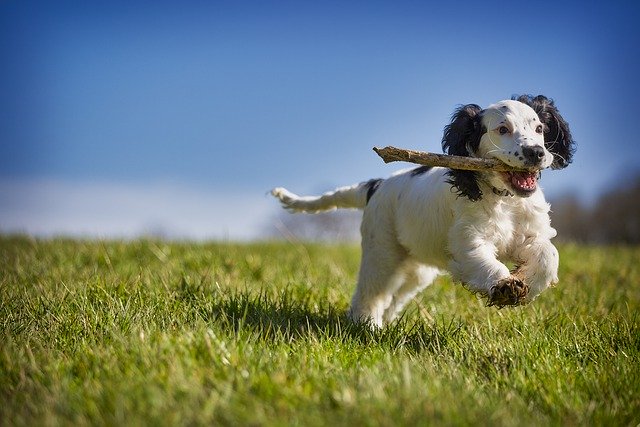
Calm the puppy
In severe cases of hiccups, calming and relaxing your dog may help. Move the from the current dry area into a cool, quiet place and try to massage or gently pat the dog on the chest to relax the diaphragm. There are several canine massage techniques you can try on your pup to stop the hiccups. You can find them online in places like YouTube or others like it.
Slowdown His Eating Pace
Puppies can sometimes get hiccups when they eat too fast. If this is the case with your pup, you should try slowing the eating pace. An interactive dog feeder/slow feeder may help in this regard as they slow down mealtime and help your pup eat more gently. However, try doing your part by not disturbing your puppy whenever he is eating to prevent the air swallowing that could lead to hiccups.
Low-grain Food
Avoid feeding your puppy food high grain food (filler-packed). Instead, feed the dog low-grain foods containing beneficial nutrients like protein, vitamins, and minerals. Not only is this highly important at this growing stage, but they also help to minimize hiccups. Also, if you suspect your dog gets hiccups more when fed certain foods, you may want to observe for a while to figure out which types of food trigger the hiccup sessions.
You can check our list of the best grain free puppy food here.
Feed the Dog Something Sweet
Having your puppy pooch lick a sweet-tasting stick liquid can help stop hiccups. How does this work? The sweetness distracts your pooch, coats the throat, soothes irritation, helps relax, and regulates his breathing pattern.
Something sweet and sticky like peanut butter, honey, or maple syrup will help. You can add any of these to some quantity of water and have your dog lap it up.
When Puppy Hiccups Don’t Cease: What to Do
Again, puppy hiccups will go away without help within minutes or with some of the simple remedies outlined above. Even then, as they grow, the hiccups will probably be left behind at the puppy stage.
However, hiccups should become concerning when they do not stop despite all you do. If hiccups last more than a few minutes or hours, you should consider calling your vet. It is often a sign of a severe or potentially fatal respiratory or gastrointestinal disease when this happens..
Some possible underlying causes of prolonged hiccups in puppies include;
- Asthma
- Pneumonia
- Heatstroke
- Liver diseases
- Pericarditis
- Respiratory defects
- Traumatic brain injury
- Neurologic problems such as encephalitis and meningitis
Generally, even in the absence of a hiccup, you should consult your vet if you notice other symptoms like wheezing sound, coughing, difficulty in breathing, or irregular breathing.
Even with the home remedies, you still want to be precautious. For one, hiccups are involuntary and, in some cases, even violent. Only give your pup food items that do not need a lot of chewing as it is easy for them to choke on it. Also, ensure that the meals you feed it do not contain sugar replacements like xylitol, as these are unsafe for dogs and should not be allowed in any form.
Another item you should consider getting for your pup is a slow-feeding dog bowl. Unlike regular pet bowls, they make your puppy reduce the eating pace as they are designed (often maze-like or with peaks and valleys) to make the pup work more than usual for his meals. And this means less air entering the lungs as he eats.
Why Do Puppies Get Hiccups: Conclusion
Like other mammals, puppies get hiccups, which is entirely normal, even though strange at first if you’re not used to such. And thankfully, just like in humans, there are several remedies ranging from a belly rub or massage, light exercises, using a slow feeder or a spoonful of something sweet-tasting.
Any or a combination of these should make the hiccups go away within minutes and your pup back to his usual self. However, if none of these seems to do anything for him, you may need to have him checked by a vet.
As mentioned in this article, prolonged hiccups can be due to a severe underlying condition, and I listed some of the possible causes above. Again, at some point, usually after the puppy stage, the hiccup stops or reduces significantly without needing any help or causing any ongoing health issues.
That said, observe your puppy and if hiccups continue longer than a few minutes, have him checked by your vet. Even if it turns out your dog has an underlying condition, most of the possible ones can be treated or managed with medication or lifestyle changes.
About the Author
Kirsten Heggarty
Kirsten created The Pet Handbook with the aim of sharing her knowledge about pets, pet food, healthy habits, and more. All of her advice is based on years of her own experience with her pets, and feedback that she has received from grateful readers about her tips. If you want to know more please read the About Me page.

